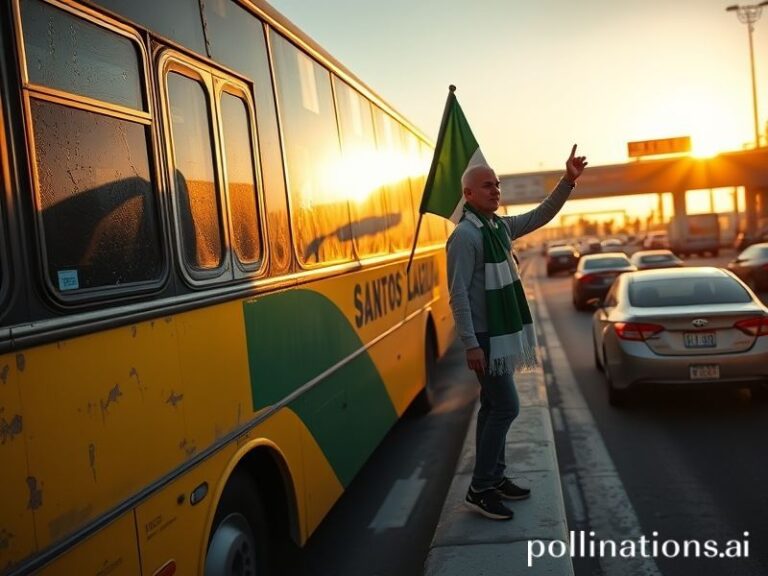Global Nightmares Inc.: How Sleep Token Turned Planetary Insomnia into a Multinational Brand
The Cult of the Masked Lullaby: How Sleep Token Became a Global Franchise of Melancholy
Dateline: Everywhere, 3 a.m. – Somewhere between the neon shrines of Tokyo and the crumbling cathedrals of Eastern Europe, an anonymous collective in porcelain masks is selling existential dread at arena scale. Sleep Token—our reigning champions of cloaked gloom-pop—have quietly turned planetary insomnia into a multinational cash cow, proving once again that if you can monetize despair, you can probably get it past customs.
The project, fronted by the perpetually masked Vessel (passport stamps unknown, dental records probably classified), started life as a boutique British cult act: moody riffs, gospel-tinged chorales, lyrics that read like a tear-stained diary translated by Google. Then came TikTok, that great equalizer of attention spans, and suddenly a song called “The Summoning” was being lip-synced by teenagers from Jakarta to Johannesburg who’d never heard of doom metal but definitely knew heartbreak. Streaming numbers spiked in 63 countries faster than you can say “algorithmic destiny,” and what began as a bedroom séance became a globe-trotting production complete with pyro, confetti cannons, and the sort of production budget once reserved for aging rock dinosaurs.
What’s remarkable—aside from the band’s refusal to drop the anonymity gimmick even while clearing passport control—is how deftly Sleep Token has franchised angst. Their touring schedule reads like a United Nations roll call: Mexico City one night, Seoul the next, then off to Berlin where fans queue in the rain wearing identical masks bought on Etsy for €19.99 plus shipping. It’s the same product everywhere: minor-key confessionals wrapped in LED-soaked spectacle, delivered by musicians whose legal names remain as elusive as a Swiss bank account. The irony, of course, is that a group predicated on secrecy has become one of the most documented phenomena on the planet—every shaky phone video another brick in the surveillance panopticon they claim to reject.
International promoters adore the model: no egos to massage, no rehab stints to insure against, just a touring party that reportedly travels under the collective alias “Cargo Cult.” Visa officers worldwide must love that. Meanwhile, ticket prices scale according to local purchasing power—$180 in New York, $45 in Buenos Aires—because misery, unlike avocado toast, is surprisingly elastic. The merch table offers multilingual depression: T-shirts that say “Worship” in Kanji, hoodies that spell “Take Me Back to Eden” in Cyrillic. A cynic might call it colonialism with a reverb pedal; a realist would call it quarterly growth.
Behind the theatrics lies a savvy commentary on modern loneliness. In an era when every nation is simultaneously overcrowded and atomized, Sleep Token provides a communal ritual that feels vaguely spiritual yet requires no actual belief—just a Spotify subscription and a willingness to sway like seaweed. Governments struggling with youth mental-health crises have begun noticing. South Korea’s Ministry of Culture, ever pragmatic, floated a grant to study whether mass sing-alongs in 7/8 time reduce adolescent anxiety (results classified). Over in the EU, bureaucrats briefly debated whether masked performances constitute a security risk, then decided the masks were less threatening than actual facial recognition.
Still, the enterprise runs on the same fuel as any other multinational: data, desire, and the faint hope that someone else understands the void. After every show, the anonymous members presumably retire to their hotel rooms, peel off the masks, and check streaming metrics—modern pilgrims counting virtual souls instead of rosary beads. Somewhere in that spreadsheet lies the real revelation: across borders, currencies, and time zones, humans will pay premium prices to feel slightly less alone for 90 minutes, provided the lighting is flattering.
Conclusion: Sleep Token hasn’t just exported British melancholy; they’ve proven that existential dread is the world’s most borderless commodity. As climate collapse accelerates and democracies wobble like cheap IKEA stools, expect more masked prophets to franchise the apocalypse. After all, if you can’t fix the planet, you might as well soundtrack its slow-motion unraveling—and charge service fees at the gate.







